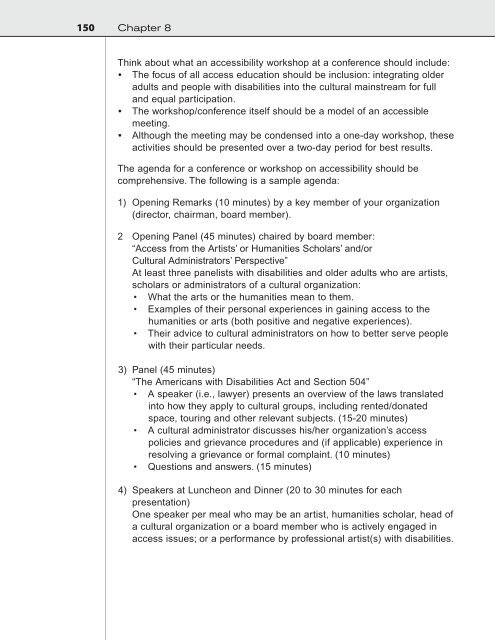Design for Accessibility: A Cultural Administrator's Handbook
Design for Accessibility: A Cultural Administrator's Handbook
Design for Accessibility: A Cultural Administrator's Handbook
You also want an ePaper? Increase the reach of your titles
YUMPU automatically turns print PDFs into web optimized ePapers that Google loves.
150 Chapter 8<br />
Think about what an accessibility workshop at a conference should include:<br />
• The focus of all access education should be inclusion: integrating older<br />
adults and people with disabilities into the cultural mainstream <strong>for</strong> full<br />
and equal participation.<br />
• The workshop/conference itself should be a model of an accessible<br />
meeting.<br />
• Although the meeting may be condensed into a one-day workshop, these<br />
activities should be presented over a two-day period <strong>for</strong> best results.<br />
The agenda <strong>for</strong> a conference or workshop on accessibility should be<br />
comprehensive. The following is a sample agenda:<br />
1) Opening Remarks (10 minutes) by a key member of your organization<br />
(director, chairman, board member).<br />
2 Opening Panel (45 minutes) chaired by board member:<br />
“Access from the Artists’ or Humanities Scholars’ and/or<br />
<strong>Cultural</strong> Administrators’ Perspective”<br />
At least three panelists with disabilities and older adults who are artists,<br />
scholars or administrators of a cultural organization:<br />
• What the arts or the humanities mean to them.<br />
• Examples of their personal experiences in gaining access to the<br />
humanities or arts (both positive and negative experiences).<br />
• Their advice to cultural administrators on how to better serve people<br />
with their particular needs.<br />
3) Panel (45 minutes)<br />
“The Americans with Disabilities Act and Section 504”<br />
• A speaker (i.e., lawyer) presents an overview of the laws translated<br />
into how they apply to cultural groups, including rented/donated<br />
space, touring and other relevant subjects. (15-20 minutes)<br />
• A cultural administrator discusses his/her organization’s access<br />
policies and grievance procedures and (if applicable) experience in<br />
resolving a grievance or <strong>for</strong>mal complaint. (10 minutes)<br />
• Questions and answers. (15 minutes)<br />
4) Speakers at Luncheon and Dinner (20 to 30 minutes <strong>for</strong> each<br />
presentation)<br />
One speaker per meal who may be an artist, humanities scholar, head of<br />
a cultural organization or a board member who is actively engaged in<br />
access issues; or a per<strong>for</strong>mance by professional artist(s) with disabilities.


